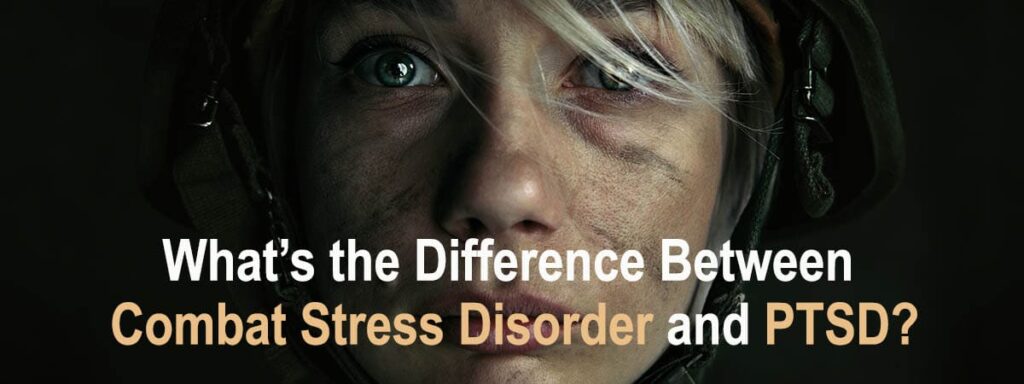What’s the Difference Between Combat Stress Disorder and PTSD?
Combat stress disorder and PTSD are two very different conditions. Unfortunately, they can look very similar which may make them difficult to discern.
What are combat stress disorder and PTSD? And more importantly, what can be done to treat them, asks the staff at Honey Lake Clinic?
By definition, combat stress is a reaction to combat experiences. After being in a combat zone where people are under constant physiological stress (poor diet, extreme temperatures, lack of rest, little opportunity for personal hygiene, etc.) and psychological stress (concerns about the presence of improvised explosive devices or snipers or the death of fellow service members), it is to be expected that most people will experience a number of emotional responses.
These responses often show up as hyperstartle (that exaggerated response when something surprises you, like a loud noise), hypervigilance (being always on guard or super-alert), bad dreams/nightmares, irritability, sleep problems, and etc.
While these experiences sound negative, some of these reactions are actually considered adaptive, notably hyperstartle and hypervigilance, as well as other benefits of combat stress, including increased physical strength, better endurance and enhanced feelings of competency.
In other words, some measure of combat stress is to be expected and may even be lifesaving.
PTSD, on the other hand, refers to a psychiatric disorder which impairs functioning. It is considered very serious whereas combat stress is considered normal.
To be diagnosed with PTSD, a number of specific symptoms have to be present following the experience of a traumatic event. These include:
- re-experiencing symptoms, such as recurrent dreams, flashbacks or intrusive images
- avoidance symptoms, such as avoiding conversations about the event or people associated with the event
- memory loss
- sleep disturbance
- irritability/anger problems
- concentration difficulties
- hypervigilance and/or hyperstartle
Similar Symptoms
While combat stress and PTSD share a number of symptoms, they aren’t viewed the same way.
Combat stress disorder isn’t considered an ongoing problem which needs treatment—for many war veterans, combat stress wears off after being back home for a few weeks or months.
Still, combat stress, unchecked, can morph into ongoing difficulties including PTSD. For this reason, processing combat stress is tremendously important—being in contact and maintaining relationships with other veterans who understand and can relate, having a plan for anniversaries of friends’ deaths, keeping substance use in check, and other similar steps can ease the transition back to civilian life from the combat zone.
Many veterans find American Legions, Veterans of Foreign Wars (VFWs) and other veteran-centric groups are significant assets in effectively dealing with combat stress.
Post-Traumatic Stress Disorder (PTSD) on the other hand is a serious mental health condition which doesn’t wear off but requires treatment.
Treatment for PTSD may involve some of the same concepts employed in effectively managing combat stress, but under the supervision of a mental health professional.
The good news is that PTSD is treatable. The prognosis is good for those who do seek help. The earlier help is sought, the better the outcome. There are very effective treatments available for people suffering with PTSD.
Therapies such as Cognitive Processing Therapy and Exposure Therapy help with not only symptom resolution but also in forming lifelong strategies for the effective management of disturbing wartime experiences, decreasing the likelihood of symptom recurrence.
The bad news is that PTSD is often a progressive disorder. Not only is it unlikely to go away on its own, but left untreated, the symptoms can become much worse with time.
PTSD can become debilitating, interfering with your day-to-day life in a number of ways. Commonly, untreated
PTSD sufferers go on to experience:
- Substance abuse in an attempt to calm anxiety, which only exacerbates the problem.
- Anger management issues as recurring stress and anxiety result in outbursts of anger or rage. This may result in child or spousal abuse or public violence.
- Loneliness as PTSD can make a person very difficult to be around. Sufferers may end up isolated and alone.
- Severe depression is always a risk with PTSD. Sufferers may even demonstrate suicidal thoughts or actions while in the midst of a PTSD episode.
PTSD is complicated, with dangerous physical and psychological consequences if not treated properly.
Get help.
A good assessment and an accurate diagnosis is your first step in treating PTSD. Getting the right specialist to implement the best-fitting treatment for your particular situation and symptoms is key.
At Honey Lake Clinic, our experienced staff, licensed therapists, psychologists, and psychiatrists understand that effective treatment for PTSD requires a multifaceted approach, involving healing of the mind, body, and spirit.
Let us offer hope and provide answers for you.
